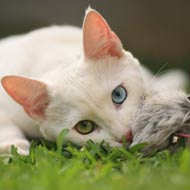
New book calls on owners to keep their cats indoors
Cats that are allowed to roam outside should be put on a leash, according to a new book.
Speaking to The Today Programme, Dr Peter Marra - author of Cat Wars - claimed all felines should be banned from roaming outside because they are having a “devastating impact” on bird populations.
The academic - who is head of the Smithsonian Migratory Bird Centre - also said stray cats should be captured and, if they can’t be re-homed, "they will need to be euthanised".
Dr Marra’s book is based on a series of studies on cat predation that claim to show the damage cats inflict in small mammals and birds. The scientist says over eight million cats in the UK are responsible for the death of 275 million prey items per year - 55 million of which are birds.
"We've known for over 100 years that cats can have devastating consequences on biodiversity. The science on the impacts on human health have become more and more clear over the last 20 years, and it's clear that cats are no having really significant impact on human health," he said.
He adds that it is ‘inhumane’ to let cats outside where they can get hit by cars, mauled by dogs, or pick up diseases.
"Cats that are allowed, that are owned, that are allowed to roam outside - that needs to stop. People that own their cats need to either put them on a leash or put them in a thing called 'catios'".
Not surprisingly, Dr Marra’s comments have reignited the debate over the impact of cats on birds, and what should be done about it.
Following the interview, Cats Protection issued a statement claiming that research by the RSPB has not shown that cats are the primary cause of decline in numbers of any bird of conservation concern in the UK.
“Research has cited many other factors for bird and small mammal species loss, including mismanagement and loss of traditional wildlife habitat, climate change and the increased use of pesticides and fertilisers in modern farming practices,” they write.
“Cats also tend to kill weak and sickly birds so it is not clear whether cat predation replaces other forms of death, or is in addition to natural death.”
Responding to Dr Marra’s comments about keeping cats indoors Cats Protection argue that, ideally, all cats should have access to the outdoors during the daytime to express their natural behaviour.
“Cats have a natural tendency to explore so allowing them access to the outside world gives them mental stimulation and reduces stress, which can lead to can lead to negative behaviour such as scratching or spraying indoors.



 The latest
The latest